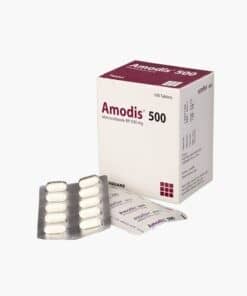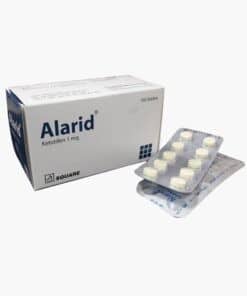Isovent 200 | Tablet | 10 pcs
৳ 151.00
Brand Name: Isovent Tablet
Generic: Misoprostol
200 mcg
Manufacturer: Square Pharmaceuticals Ltd.
Unit Price: ৳ 15.10 (30’s pack: ৳ 453.00)
Indications
Antiulcerant Indication: Misoprostol is indicated for reducing the risk of NSAID (nonsteroidal anti-inflammatory drugs, including aspirin) induced gastric ulcers in patients at high risk of complications from gastric ulcer, eg, the elderly and patients with concomitant debilitating disease, as well as patients at high risk of developing gastric ulceration, such as patients with a history of ulcer. Misoprostol has not been shown to reduce the risk of duodenal ulcers in patients taking NSAIDs. Misoprostol should be taken for the duration of NSAID therapy. It had no effect, compared to placebo, on gastrointestinal pain or discomfort associated with NSAID use.
Gynecological Indication: Labor induction (in unfavorable cervical conditions) In the prevention & treatment of Postpartum Hemorrhage (PPH)
Therapeutic Class
Pharmacology
Dosage & Administration
Anti-ulcerant dosage & administration:
- The recommended adult oral dose for reducing the risk of NSAID-induced gastric ulcers: 200 mcg Misoprostol four times daily with food. If this dose cannot be tolerated, a dose of 100 mcg can be used. Misoprostol should be taken for the duration of NSAID therapy as prescribed by the physician. Misoprostol should be taken with a meal, and the last dose of the day should be at bedtime.
- Renal impairment: Adjustment of the dosing schedule in renally impaired patients is not routinely needed, but dosage can be reduced if the 200 mcg dose is not tolerated.
Gynecological dosage & administration-
- Induction of Labor: 25 mcg vaginally 6 hourly or, 50 mcg orally 4 hourly.
- Postpartum Hemorrhage (PPH) prophylaxis: 400 mcg to 600 mcg orally or rectally immediately following delivery of the child.
- Postpartum Hemorrhage (PPH) treatment: 1,000 mcg rectally or, 200 mcg orally with 400 mcg sublingually.
Interaction
Contraindications
Side Effects
Gastrointestinal: GI disorders had the highest reported incidence of adverse events for patients receiving this preparation. It can cause more abdominal pain, diarrhea and other GI symptoms. The incidence of diarrhea can be minimized by administering it with food and by avoiding co administration with magnesium-containing antacids.
Gynecological: Gynecological disorders such as spotting, cramps, hypermenorrhea, menstrual disorder and dysmenorrhea have been reported. Postmenopausal vaginal bleeding may be related to Misoprostol administration.
Elderly: Overall, there were no significant differences in the safety profile in patients 65 years of age or older compared with younger patients.
Pregnancy & Lactation
Pregnancy: Misoprostol is contraindicated to pregnant women.
Lactation: It is not known whether Misoprostol’s active metabolite- misoprostol acid is excreted in human milk. Misoprostol should not be administered to nursing mothers because the excretion of misoprostol acid could cause diarrhea in nursing infants.
Precautions & Warnings
Overdose Effects
Storage Conditions
| Generic Name | Misoprostol |
|---|
Only logged in customers who have purchased this product may leave a review.













Reviews
There are no reviews yet.